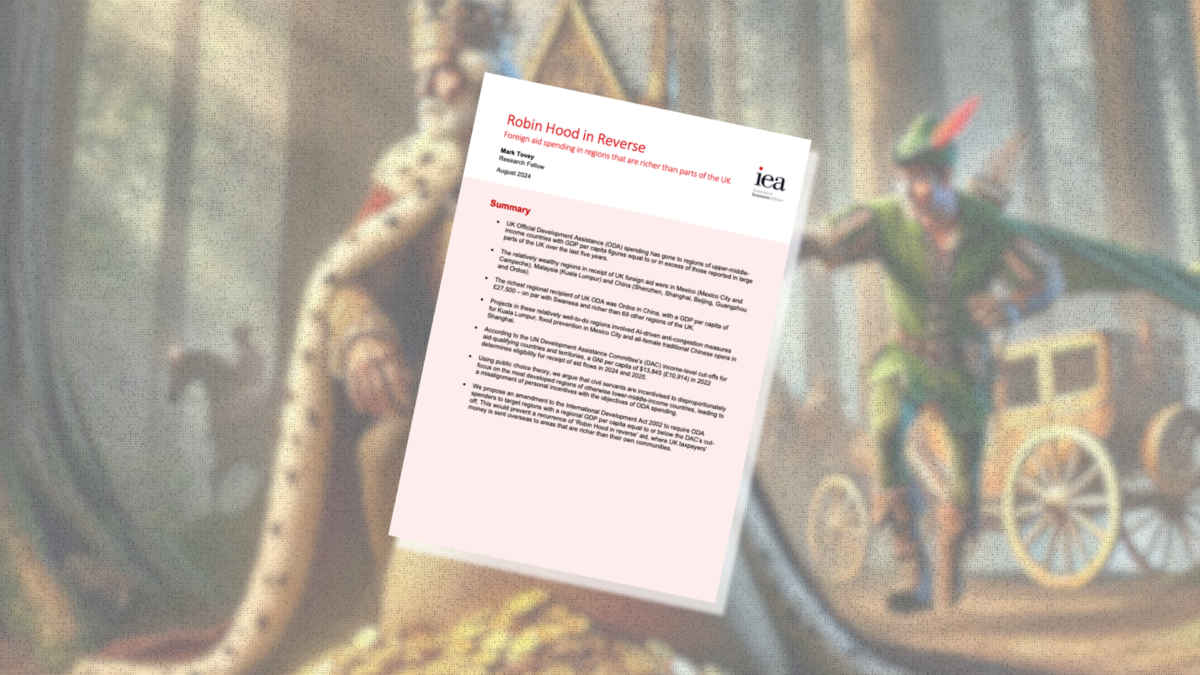Foreign aid spent in regions richer than parts of Britain, new IEA briefing reveals
SUGGESTED

IEA research referenced in The Financial Times


- UK Official Development Assistance (ODA) spent in regions with higher GDP per capita than some parts of the UK.
- Misallocation of development funds to wealthy regions means less money for the poorest, undermining global poverty reduction efforts.
- The richest recipient, Ordos in China, has GDP per capita of £27,500 – more than 69 UK regions.
- The International Development Act should be amended to prevent ‘Robin Hood in reverse’ aid.
British taxpayers’ money has been directed to regions of upper-middle-income countries that are wealthier than parts of the United Kingdom, according to a new briefing paper from the Institute of Economic Affairs (IEA).
The report, Robin Hood in Reverse, authored by IEA Research Fellow Mark Tovey, reveals that UK foreign aid has been spent in affluent areas of China, Mexico, and Malaysia over the past five years. This includes Ordos in China, with a GDP per capita of £27,500 – on par with Swansea and richer than 69 other regions of the UK.
Projects funded in these wealthy regions include AI-driven anti-congestion measures for Kuala Lumpur, an all-female traditional Chinese opera in Shanghai and a rural crafts exhibition in Shenzhen. In Mexico City, British taxpayers funded a temporary cycle lane and financial technology education.
Eight regions receiving UK aid had higher GDP per capita than Ards and North Down, the UK’s poorest region (£17,635 GDP per capita). Aid recipients also included Beijing, and Guangzhou in China, as well as Campeche in Mexico.
The briefing paper proposes an amendment to the International Development Act 2002 to require overseas development aid to target regions with a GDP per capita equal to or below the OECD Development Assistance Committee’s cut-off for aid eligibility. This would prevent the recurrence of aid being sent to areas richer than the communities of UK taxpayers funding it.
The paper also warns that civil servants and aid workers may be drawn to spending money in developed cities in middle-income countries, as these places have better infrastructure, more comfortable living conditions, and established professional networks. As a result, taxpayer money can end up in areas that are already relatively well-off rather than in the poorest regions that need help the most.
Mark Tovey, paper author and freelance journalist, said:
“Taxing hard-working people in left-behind Britain to fund projects in affluent regions abroad is a policy of Robin Hood in reverse, with aid money going to prosperous areas like Ordos in China or Campeche in Mexico—both of which are actually richer than large parts of the UK.
“We urgently need to reevaluate our aid priorities to ensure that UK taxpayers’ money supports the world’s poorest, focusing on stamping out infectious diseases, ending hunger, and genuinely lifting those in desperate need out of poverty.”
ENDS
Notes to Editors
Contact: media@iea.org.uk / 07763 365520
Read a full copy of Robin Hood in Reverse: Foreign aid spending in regions that are richer than parts of the UK.
About the author
Mark Tovey is a freelance researcher and the author of the IEA discussion papers Is There a Doctor in the House (2021) and Nanny State on Tour (2020). He works as a data journalist for a boutique news agency and as a financial writer for various websites. He holds a first-class degree in economics from the University of Sussex.
The mission of the Institute of Economic Affairs is to improve understanding of the fundamental institutions of a free society by analysing and expounding the role of markets in solving economic and social problems. The IEA is a registered educational charity and independent of all political parties.



